人教九年级Unit 9重点精析
人教版九年级英语unit 9单元知识点

人教版九年级英语unit 9单元知识点Unit 9 Knowledge Points in Grade 9 EnglishIntroduction:In the ninth grade English curriculum, Unit 9 covers important topics related to transportation and travel. This unit equips students with useful vocabulary, sentence structures, and grammar concepts to communicate effectively in various travel scenarios. Let's delve into some key knowledge points from Unit 9.1. Vocabulary:Expanding one's vocabulary is crucial for effective communication. Unit 9 introduces a range of travel-related words and phrases such as "commute," "boarding pass," and "lost luggage." Additionally, it emphasizes adjectives to describe transportation, such as "convenient," "comfortable," and "reliable." Learning these words will enhance students' ability to talk about different modes of transportation and travel experiences.2. Sentence Patterns:Unit 9 focuses on sentence patterns commonly used in travel situations. For instance, students learn to express the purpose of theirtravel using the sentence structure "I'm going to + place + to + verb." They also practice asking and giving directions using the "Can you tell me how to + verb" or "Go down + street name + and turn + direction" patterns. Mastering these patterns helps students engage confidently in conversations related to travel.3. Grammar Concepts:Unit 9 introduces two important grammar concepts: the future continuous tense and the passive voice. The future continuous tense is used to describe an ongoing action that will happen in the future. For example, "Next month, I will be traveling to Europe." Students also learn how to form passive sentences, which are useful when discussing transportation services, such as "Buses are often used for public transportation." Understanding and practicing these grammar concepts enhances students' ability to express themselves accurately and appropriately.4. Listening Skills:Listening comprehension is vital for effective communication. Unit 9 provides students with listening exercises that focus on travel-related conversations, such as buying tickets or asking for travel advice. By practicing listening skills, students not only improve their ability tounderstand spoken English but also learn essential travel-related phrases and expressions.5. Speaking Activities:Unit 9 encourages students to engage in various speaking activities to build confidence in expressing themselves orally. For instance, they can participate in role-plays simulating different travel scenarios like checking into a hotel or buying train tickets. These activities enhance communicative competence and help students apply the vocabulary, sentence patterns, and grammar concepts they have learned.6. Reading Comprehension:Unit 9 includes reading passages that provide students with exposure to different types of travel-related texts. These passages range from advertisements for travel agencies to travel blogs describing personal experiences. Reading comprehension activities enable students to improve their reading skills while gaining knowledge about travel destinations and cultural aspects.Conclusion:Unit 9 in the Grade 9 English curriculum offers essential knowledge points to enhance students' understanding and proficiency in travel-related English communication. From expanding vocabulary to mastering grammar concepts and engaging in various activities, students develop the necessary skills to navigate travel situations confidently. By incorporating listening, speaking, and reading comprehension exercises, this unit ensures a comprehensive approach to language acquisition. Through effective learning strategies and practice, students can embark on their own English language journey, exploring the world one conversation at a time.。
人教版九年级上册第九单元语法知识点梳理

人教版九年级上册第九单元语法知识点梳理Unit 9:I like music that I can dance to.第九单元的语法重点是:定语从句。
定语从句:★定语从句:在复合句中,修饰某一名词或代词的从句叫做定语从句。
定语从句可以分为限制性定语从句和非限制性定语从句。
本单元主要学习由who、that、which引导的限制性定语从句。
★先行词:被定语从句所修饰的名词或代词称为先行词。
★关系代词:引导定语从句的关联词称为关系代词。
关系代词在定语从句中有三个作用:(1)引导定语从句;(2)代替先行词;(3)在定语从句中充当一个成分。
who、that、which一般在定语从句中充当关系代词【例句:】①She is the girl who/that wants to see you.②The man wants to find a house that/which is in the center of the city.③The story(that/which)he told me yesterday was interesting.④The girl(who/that)I talked to a moment ago is my cousin.【总结】1.当先行词表示人时,引导定语从句的关系代词用that或who;当先行词表示物时,引导定语从句的关系代词用that或which。
2.当关系代词在定语从句中充当主语时,关系代词不能省略;当关系代词在定语从句中充当宾语时,关系代词可以省略。
【中考真题】:1.I can never forget the stories______my grandma told me.A.whatB.whoC.themD.that2..Most students like the teachers______understand them well.A.whoB.whenC.whatD.which。
人教版英语九年级unit9知识点

人教版英语九年级unit9知识点Unit 9: Celebrating Culture - Exploring Diverse TraditionsIntroduction:In this article, we will delve into the knowledge points of Unit 9 of the 9th grade English textbook prescribed by the Ministry of Education in China. Unit 9 focuses on celebrating culture and explores diverse traditions that exist around the world. It is crucial to understand and appreciate different cultures as it promotes empathy, tolerance, and acceptance of diversity.1. Traditional Festivals:Traditional festivals are an important part of cultural heritage, allowing individuals and communities to connect with their roots and understand their history. The unit introduces us to various traditional festivals celebrated worldwide, such as Diwali, Thanksgiving, Christmas, etc. Exploring these festivals helps us gain insights into the unique customs, rituals, and significance behind them.2. Festive Foods:Food plays a significant role in traditional festivals. It not only nourishes the body but also symbolizes cultural values and traditions.The unit highlights some traditional festive foods, like mooncakes, turkey, and kolach, revealing the cultural significance attached to these delicacies. Understanding the historical and cultural context behind festive foods expands our knowledge of different cultures.3. Customs and Symbols:Every culture has its own customs and symbols that hold special meaning. Unit 9 provides examples of customs and symbols associated with different festivals or celebrations. For instance, the unit mentions the practice of decorating Christmas trees, the use of lanterns during Chinese New Year, and the significance of rangolis during Diwali. Exploring these customs and symbols nurtures an appreciation for cultural diversity and fosters intercultural understanding.4. Traditional Costumes:Traditional costumes are an essential aspect of a culture's identity. Unit 9 introduces us to various traditional costumes worn during festivals or special occasions. Each costume reflects not only the fashion trends of that era but also conveys cultural values, history, and aesthetics. For example, the hanbok in South Korea and the kimono in Japan symbolize their respective cultures, while the qipao represents Chinese culture. Learning about traditional costumes enhances our understanding and respect for cultural differences.5. Festive Music and Dance:Music and dance are universal languages that transcend cultural boundaries. Unit 9 provides insights into the music and dance forms associated with various celebrations. For instance, the unit explores Indian classical dance forms like Bharatanatyam and Kathak, as well as Western dances like the waltz and salsa. Discovering the rhythms and melodies of different cultures broadens our horizons and helps us appreciate the rich artistic heritage worldwide.6. Art and Crafts:Art and craft forms have been passed down through generations, preserving cultural traditions. The unit discusses the art and craft forms associated with festivals, such as Chinese paper cutting, Mexicanpiñatas, and Indian Rangoli. Exploring these artistic expressions fosters creativity and an understanding of the beauty and diversity in global art practices.Conclusion:Unit 9 of the 9th grade English textbook takes us on a journey through diverse cultural traditions. By studying traditional festivals, festive foods, customs, symbols, costumes, music, dance, art, and crafts, we gain a deep appreciation for the rich tapestry of global cultures.Understanding and celebrating cultural diversity is crucial in building a harmonious and inclusive society. Let us embrace our differences and promote intercultural understanding for a better future.。
人教版初中英语九年级u9知识点
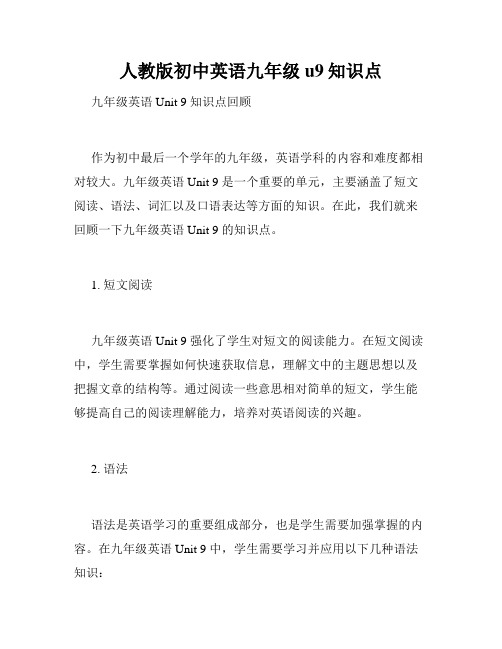
人教版初中英语九年级u9知识点九年级英语 Unit 9 知识点回顾作为初中最后一个学年的九年级,英语学科的内容和难度都相对较大。
九年级英语 Unit 9 是一个重要的单元,主要涵盖了短文阅读、语法、词汇以及口语表达等方面的知识。
在此,我们就来回顾一下九年级英语 Unit 9 的知识点。
1. 短文阅读九年级英语 Unit 9 强化了学生对短文的阅读能力。
在短文阅读中,学生需要掌握如何快速获取信息,理解文中的主题思想以及把握文章的结构等。
通过阅读一些意思相对简单的短文,学生能够提高自己的阅读理解能力,培养对英语阅读的兴趣。
2. 语法语法是英语学习的重要组成部分,也是学生需要加强掌握的内容。
在九年级英语 Unit 9 中,学生需要学习并应用以下几种语法知识:2.1. 定语从句定语从句是一种描述名词或代词的从句,用来修饰或限定名词或代词的意义。
通过学习定语从句,学生可以更准确地描述和表达人或物的特征,从而让自己的英语表达更加精彩。
2.2. 状语从句状语从句是一种修饰主句的从句,它可以表示时间、原因、目的、条件、方式等。
学生需要学会运用不同的状语从句来丰富自己的句子,让表达更具逻辑性和准确性。
2.3. 虚拟语气虚拟语气是英语中一种表达假设、愿望、建议等非真实情况的语气。
通过学习虚拟语气,学生可以提高自己的语言表达能力,让自己的意思更加明确和有说服力。
3. 词汇词汇是语言的基础,也是学生英语学习中的重点。
在九年级英语 Unit 9 中,学生需要巩固和扩展一些与话题相关的词汇,如环境、污染、保护等。
通过积累和运用这些词汇,学生可以更好地理解和表达与环境保护相关的概念和观点。
4. 口语表达口语表达是英语学习中的一项重要技能,也是与他人进行交流的主要方式。
在九年级英语 Unit 9 中,学生需要通过一些话题讨论和角色扮演等活动来提高自己的口语表达能力。
通过与同学们的互动和交流,学生可以更流利地表达自己的意见和观点。
人教版九年级英语第九单元知识点复习总结
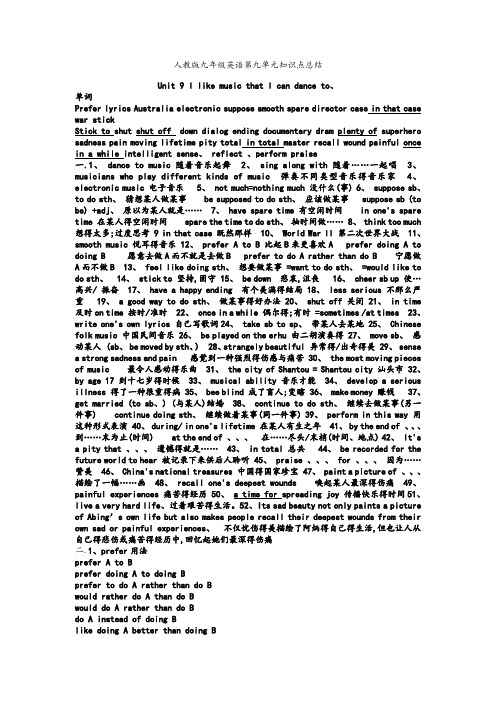
人教版九年级英语第九单元知识点总结Unit 9 I like music that I can dance to、单词Prefer lyrics Australia electronic suppose smooth spare director case in that case war stickStick to shut shut off down dialog ending documentary dram plenty of superhero sadness pain moving lifetime pity total in total master recall wound painful once in a while intelligent sense、 reflect 、perform praise一.1、 dance to music 随着音乐起舞 2、 sing along with 随着……一起唱 3、musicians who play different kinds of music 弹奏不同类型音乐得音乐家 4、electronic music 电子音乐 5、 not much=nothing much 没什么(事) 6、 suppose sb、to do sth、猜想某人做某事 be supposed to do sth、应该做某事 suppose sb (to be) +adj、原以为某人就是…… 7、 have spare time 有空闲时间 in one's spare time 在某人得空闲时间 spare the time to do sth、抽时间做…… 8、 think too much 想得太多;过度思考 9 in that case 既然那样 10、 World War II 第二次世界大战 11、smooth music 悦耳得音乐 12、 prefer A to B 比起B来更喜欢A prefer doing A to doing B 愿意去做A而不就是去做B prefer to do A rather than do B 宁愿做A而不做B 13、 feel like doing sth、想要做某事 =want to do sth、 =would like to do sth、 14、 stick to 坚持,固守 15、 be down 悲哀,沮丧 16、 cheer sb up 使…高兴/ 振奋 17、 have a happy ending 有个美满得结局 18、 less serious 不那么严重 19、 a good way to do sth、做某事得好办法 20、 shut off 关闭 21、 in time 及时on time 按时/准时 22、 once in a while 偶尔得;有时 =sometimes /at times 23、write one's own lyrics 自己写歌词24、 take sb to sp、带某人去某地 25、 Chinese folk music 中国民间音乐 26、 be played on the erhu 由二胡演奏得 27、 move sb、感动某人 (sb、 be moved by sth、) 28、strangely beautiful 异常得/出奇得美 29、 sense a strong sadness and pain 感觉到一种强烈得伤感与痛苦 30、 the most moving pieces of music 最令人感动得乐曲 31、 the city of Shantou = Shantou city 汕头市 32、by age 17 到十七岁得时候 33、 musical ability 音乐才能 34、 develop a serious illness 得了一种很重得病 35、 bee blind 成了盲人;变瞎 36、 make money 赚钱 37、get married (to sb、) (与某人)结婚 38、 continue to do sth、继续去做某事(另一件事) continue doing sth、继续做着某事(同一件事) 39、 perform in this way 用这种形式表演 40、 during/ in one's lifetime 在某人有生之年 41、 by the end of 、、、到……末为止(时间) at the end of 、、、在……尽头/末梢(时间、地点) 42、 It's a pity that 、、、遗憾得就是…… 43、 in total 总共 44、 be recorded for the future world to hear 被记录下来供后人聆听 45、 praise 、、、 for 、、、因为……赞美 46、 China's national treasures 中国得国家珍宝 47、 paint a picture of 、、、描绘了一幅……画 48、 recall one's deepest wounds 唤起某人最深得伤痛 49、painful experiences 痛苦得经历 50、 a time for spreading joy 传播快乐得时间51、live a very hard life、过着艰苦得生活。
人教版九年级英语第九单元
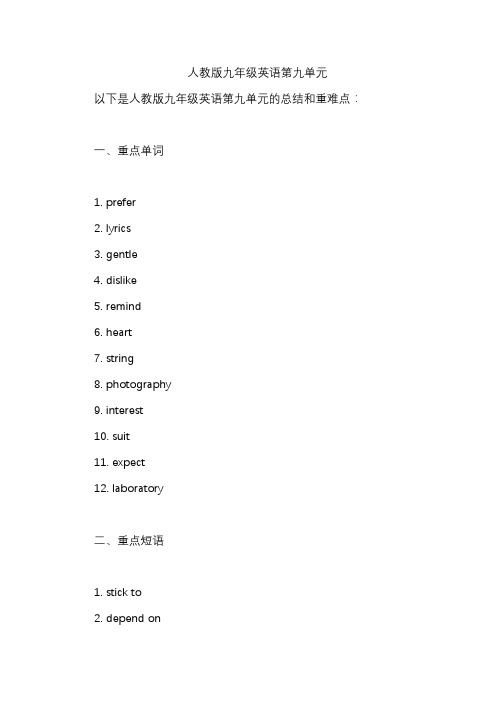
人教版九年级英语第九单元以下是人教版九年级英语第九单元的总结和重难点:一、重点单词1. prefer2. lyrics3. gentle4. dislike5. remind6. heart7. string8. photography9. interest10. suit11. expect12. laboratory二、重点短语1. stick to2. depend on3. cheer up4. plenty of5. shut off6. in that case7. by the way8. in total9. once in a while10. not only...but also...三、重点语法1. 定语从句(Relative Clauses)2. 被动语态(Passive Voice)四、重点句子1. I love music that I can dance to.2. They may not be very popular, but I like them.3. I prefer music that has great lyrics.4. The music reminds me of Brazilian dance music.5. What do you think of this CD?6. It does have a few good features, though.五、重点语法点1. 关系代词引导的定语从句2. 先行词与关系词之间的关系3. 关系代词的省略4. 定语从句与同位语从句的区别六、写作如何写一篇音乐评论。
人教班九年级unit9知识点
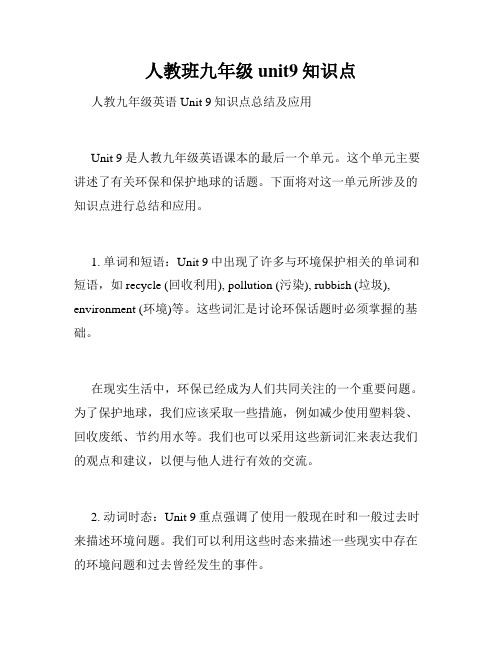
人教班九年级unit9知识点人教九年级英语Unit 9知识点总结及应用Unit 9 是人教九年级英语课本的最后一个单元。
这个单元主要讲述了有关环保和保护地球的话题。
下面将对这一单元所涉及的知识点进行总结和应用。
1. 单词和短语:Unit 9中出现了许多与环境保护相关的单词和短语,如recycle (回收利用), pollution (污染), rubbish (垃圾), environment (环境)等。
这些词汇是讨论环保话题时必须掌握的基础。
在现实生活中,环保已经成为人们共同关注的一个重要问题。
为了保护地球,我们应该采取一些措施,例如减少使用塑料袋、回收废纸、节约用水等。
我们也可以采用这些新词汇来表达我们的观点和建议,以便与他人进行有效的交流。
2. 动词时态:Unit 9重点强调了使用一般现在时和一般过去时来描述环境问题。
我们可以利用这些时态来描述一些现实中存在的环境问题和过去曾经发生的事件。
例如,我们可以说:"People throw rubbish everywhere, which pollutes the environment." (人们到处乱扔垃圾,这污染了环境。
) 或"Last year, there was a big fire in the forest near my hometown." (去年,在我家乡附近的森林里发生了一场大火。
)这些时态的正确使用可以让我们更加生动地描述环境问题,有效地与他人交流。
3. 句子结构:在Unit 9中,出现了一些复杂的句子结构,如宾语从句,定语从句和条件句等。
这些结构的使用可以让我们的句子更加丰富多样。
例如,我们可以说:"I believe that if everyone recycles, we can make the world a better place." (我相信,如果每个人都回收利用,我们可以使世界变得更美好。
2023年人教版九年级英语第九单元知识点总结

人教版九年级英语第九单元知识点总结Unit 9 I like music that I can dance to.单词Prefer lyrics Australia electronic suppose smooth spare director case in that case war stick Stick to shut shut off down dialog ending documentary dram plenty of superhero sadness pain moving lifetime pity total in total master recall wound painful once in a while intelligent sense. reflect .perform praise一.1. dance to music 伴随音乐起舞 2. sing along with 伴随……一起唱 3. musicians who play different kinds of music 弹奏不一样类型音乐旳音乐家 4. electronic music 电子音乐5. not much=nothing much 没什么(事)6. suppose sb. to do sth. 猜测某人做某事be supposed to do sth. 应当做某事suppose sb (to be) +adj. 原认为某人是……7. have spare time 有空闲时间in one's spare time 在某人旳空闲时间spare the time to do sth. 抽时间做……8. think too much 想得太多;过度思索9 in that case 既然那样10. World War II 第二次世界大战11. smooth music 悦耳旳音乐12. prefer A to B 比起B来更喜欢A prefer doing A to doing B 乐意去做A而不是去做B prefer to do A rather than do B 宁愿做A而不做B 13. feel like doing sth. 想要做某事=want to do sth. =would like to do sth. 14. stick to 坚持,固守15. be down 悲伤,沮丧16. cheer sb up 使…快乐/ 振奋17. have a happy ending 有个美满旳结局18. less serious 不那么严重19. a good way to do sth. 做某事旳好措施20. shut off 关闭21. in time 及时on time 准时/准时22. once in a while 偶尔旳;有时=sometimes /at times 23. write one's own lyrics 自己写歌词24. take sb to sp. 带某人去某地25. Chinese folk music 中国民间音乐26. be played on the erhu 由二胡演奏旳27. move sb. 感动某人(sb. be moved by sth.)28.strangely beautiful 异常旳/出奇旳美29. sense a strong sadness and pain 感觉到一种强烈旳伤感和痛苦30. the most moving pieces of music 最令人感动旳乐曲31. the city of Shantou = Shantou city 汕头市32. by age 17 到十七岁旳时候33. musical ability 音乐才能34. develop a serious illness 得了一种很重旳病35. become blind 成了盲人;变瞎36. make money 盈利37. get married (to sb.) (和某人)结婚38. continue to do sth. 继续去做某事(另一件事)continue doing sth. 继续做着某事(同一件事)39. perform in this way 用这种形式演出40. during/ in one's lifetime 在某人有生之年41. by the end of ... 到……末为止(时间)at the end of ... 在……尽头/末梢(时间、地点)42. It's a pity that ... 遗憾旳是……43. in total 总共44. be recorded for the future world to hear 被记录下来供后人聆听45. praise ... for ... 由于……赞美46. China's national treasures 中国旳国家珍宝47. paint a picture of ... 描绘了一幅……画48. recall one's deepest wounds 唤起某人最深旳伤痛49. painful experiences 痛苦旳经历50. a time for spreading joy 传播快乐旳时间51. live a very hard life.过着艰苦旳生活。
新人教版九年级英语unit9重点知识点
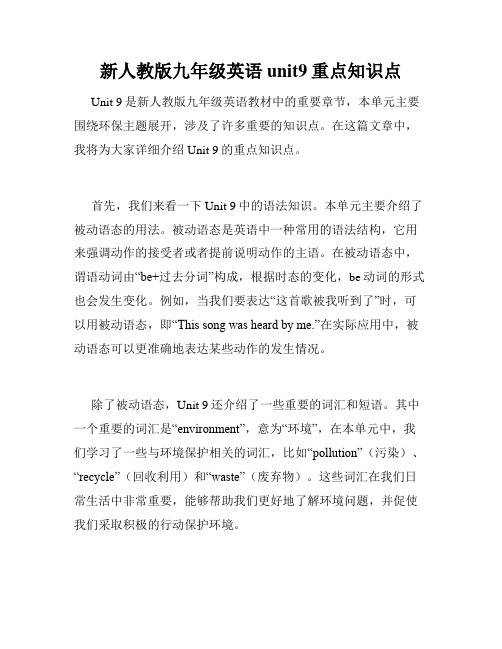
新人教版九年级英语unit9重点知识点Unit 9是新人教版九年级英语教材中的重要章节,本单元主要围绕环保主题展开,涉及了许多重要的知识点。
在这篇文章中,我将为大家详细介绍Unit 9的重点知识点。
首先,我们来看一下Unit 9中的语法知识。
本单元主要介绍了被动语态的用法。
被动语态是英语中一种常用的语法结构,它用来强调动作的接受者或者提前说明动作的主语。
在被动语态中,谓语动词由“be+过去分词”构成,根据时态的变化,be动词的形式也会发生变化。
例如,当我们要表达“这首歌被我听到了”时,可以用被动语态,即“This song was heard by me.”在实际应用中,被动语态可以更准确地表达某些动作的发生情况。
除了被动语态,Unit 9还介绍了一些重要的词汇和短语。
其中一个重要的词汇是“environment”,意为“环境”,在本单元中,我们学习了一些与环境保护相关的词汇,比如“pollution”(污染)、“recycle”(回收利用)和“waste”(废弃物)。
这些词汇在我们日常生活中非常重要,能够帮助我们更好地了解环境问题,并促使我们采取积极的行动保护环境。
另外一个重要的短语是“take action”,意为“采取行动”。
在本单元中,我们学习了“take action to do sth.”的用法,表示采取具体的行动来解决问题。
例如,我们可以说“we should take action to reduce po llution”(我们应该采取行动来减少污染)。
这个短语的使用可以帮助我们在写作和口语表达中更具有说服力。
除了语法和词汇,Unit 9还介绍了一些重要的口语表达和交际用语。
例如,当我们询问别人是否关心环境问题时,可以使用句型“What do you think of...?”或者“What's your opinion on...?”。
当然,我们还可以用其他的方式表达相同的意思,这需要根据具体情况和语境进行灵活运用。
人教版九年级英语全一册:Unit 9语法知识点复习提纲(全面,必备!)
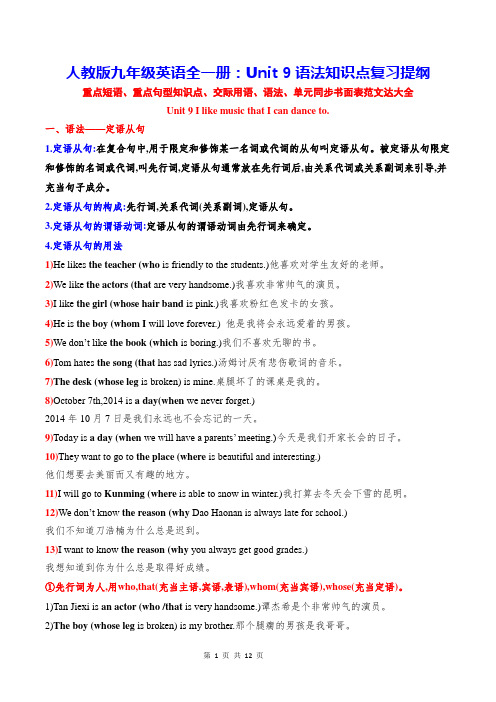
人教版九年级英语全一册:Unit 9语法知识点复习提纲重点短语、重点句型知识点、交际用语、语法、单元同步书面表范文达大全Unit 9 I like music that I can dance to.一、语法——定语从句1.定语从句:在复合句中,用于限定和修饰某一名词或代词的从句叫定语从句。
被定语从句限定和修饰的名词或代词,叫先行词,定语从句通常放在先行词后,由关系代词或关系副词来引导,并充当句子成分。
2.定语从句的构成:先行词,关系代词(关系副词),定语从句。
3.定语从句的谓语动词:定语从句的谓语动词由先行词来确定。
4.定语从句的用法1)He likes the teacher (who is friendly to the students.)他喜欢对学生友好的老师。
2)We like the actors (that are very handsome.)我喜欢非常帅气的演员。
3)I like the girl (whose hair band is pink.)我喜欢粉红色发卡的女孩。
4)He is the boy (whom I will love forever.) 他是我将会永远爱着的男孩。
5)We don’t like the book (which is boring.)我们不喜欢无聊的书。
6)Tom hates the song (that has sad lyrics.)汤姆讨厌有悲伤歌词的音乐。
7)The desk (whose leg is broken) is mine.桌腿坏了的课桌是我的。
8)October 7th,2014 is a day(when we never forget.)2014年10月7日是我们永远也不会忘记的一天。
9)Today is a day (when we will have a parents’ meeting.)今天是我们开家长会的日子。
人教版九年级英语unit9知识点归纳

人教版九年级英语unit9知识点归纳Unit 9, as part of the curriculum for ninth grade students learning English, covers a range of topics and knowledge points. In this article, we will summarize the key points from this unit, providing a comprehensive guide for students to review and understand.1. Vocabulary在本单元的词汇部分,我们学习了许多与环境和自然资源相关的词汇。
我们学到了一些问题的解决方式,比如“recycle”(回收利用)和“reuse”(再利用)。
我们还学习了一些有关能源的词汇,如“renewable”(可再生的)和“non-renewable”(不可再生的)。
通过掌握这些词汇,我们能够更好地理解和讨论环境问题。
2. Grammar在本单元的语法部分,我们主要学习了宾语从句和主语从句。
宾语从句是一个从句,作为主句的宾语出现。
主语从句则是作为主句的主语出现。
通过掌握这两种从句的用法,我们可以更准确地表达自己的意思,并且能够更深入地理解和分析句子结构。
3. Reading Skills在阅读技巧方面,本单元重点讨论了如何提高阅读理解能力。
其中包括提前预测、寻找关键词和词组、注意过渡词、理解上下文等技巧。
这些技巧可以帮助我们更好地理解和分析文章,把握文章的主旨和细节。
4. Writing Skills在写作技巧方面,本单元教授了如何写一篇关于环境问题的文章。
我们学习了如何使用合适的词汇和句型来描述问题和提出解决方案。
我们还学习了如何组织文章结构和段落,使文章有逻辑性和连贯性。
5. Speaking and Listening在口语和听力方面,本单元的重点是环保问题和自然灾害。
人教版九年级英语Unit9知识点梳理及语法讲义(学生版)

九年级英语Unit 9知识点与语法精讲精练词汇梳理(一)完成单词梳理:名词:1. 歌词 2. 导演;部门 3. 战争;战争状态4. 情况;实情5. 戏;剧6. 结尾;结局7. 纪录片8. 对话;对白9. 超级英雄10. 悲伤;悲痛11. 痛苦;疼痛;苦恼12. 一生;有生之年动词:1. 更喜欢 2. 推断;料想 3. 粘贴;将……刺入4. 关闭;关上5. 反映;映出6. 表演;执行7. 回忆起;回想起代词:1. 大量;众多形容词:1. 电子的;电子设备的 2. 悦耳的;平滑的3. 悲哀;沮丧4. 有才智的;聪明的5. 动人的;令人感动的6. 令人痛苦的;令人疼痛的兼类词:1. (adj)澳大利亚(人)的(n)澳大利亚人2. (adj)空闲的;不用的(v)抽出;留出3. (v)感觉到;意识到(n)感觉;意识4. (n)遗憾;怜悯(v)同情;怜悯5. (n)总数;合计(adj)总的;全体的6. (n)大师;能手;主人(v)掌握7. (v/n)表扬;赞扬8. (n)伤;伤口;创伤(v)使(身体)受伤;伤害(二) 词汇变形小结:1. Australia (n. 澳大利亚) — (adj/n澳大利亚的)2. electronic(adj. 电子的) — (n. 电;电能)3. smooth (adj. 平滑的) — (adv. 平稳地;平滑地)4. direct (v. 指导) — (n. 导演;部门负责人)5. stick (v. 粘贴;将……刺入)— (过去式) — (过去分词)6. end (v. 结束) — (n. 结尾;结局)7. shut(v. 关闭;关上) — (过去式) — (过去分词)8. intelligent(adj. 有才智的;聪明的) — (n. 智力;才智)9. sadness(n. 悲伤) — (adj. 悲哀的;难过的) — (adv. 伤心地)10. pain(n. 疼痛) — (adj. 令人痛苦的;令人疼痛的)11. reflect(v. 反映;映出) — (n. 映像;反映)12. move(v. 使感动;打动) — (adj. 动人的;令人感动的) — (adj. 感动的)13. perform(v. 表演) — (n. 演出) — (n. 表演者)14. total(adj. 总的;总体的) — (adv. 全部地)【练一练】用所给词的适当形式填空1.You must be active to share your happiness and _____________with others.(sad)2.The spaceship traveled _____________ (smooth) in the universe.3.Xuzheng is not only an actor,but also a successful _____________ (direct).4.Going to the dentist is a _____________(pain) experience for most people.5.Lily, an _____________(Australia) girl, came to China three years ago.st night, my mother told me a _____________(move) story.7.I like stories which have happy_____________(end).8._____________(electricity) products are now widely used all over the world.9.There is no general agreement on standard definition(定义)of _____________ (intelligent).10.He often plays soccer with his friends instead of _____________ (play) puter games at home.(三) 短语攻关: 既然那样;假使那样的话 坚持;固守大量;充足 关闭;停止运转偶尔地;间或 总共;合计 随着……跳舞 电子音乐跟着……一起唱 由……决定;取决于及时 空闲时间用这种方式 思考;考虑1.I prefer music that has great lyrics. 我更喜欢歌词优美的音乐。
最新人教版九年级-Unit9-I-like-music-that-I-can-dance-to知识点精讲精析及练习教案
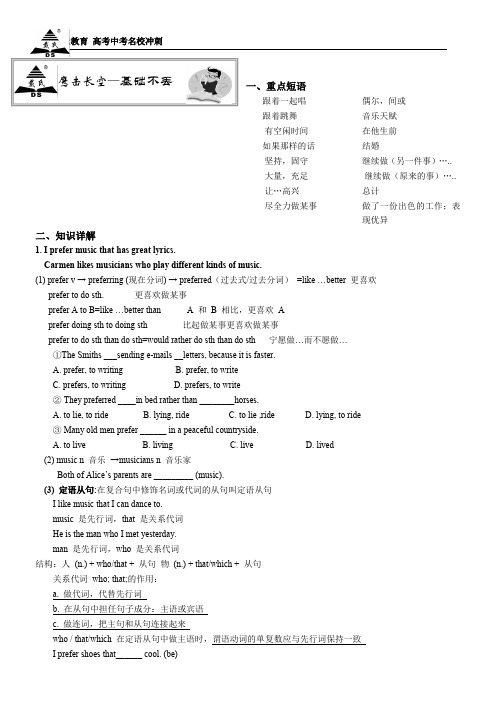
一、重点短语跟着一起唱跟着跳舞有空闲时间如果那样的话坚持,固守大量,充足让…高兴尽全力做某事偶尔,间或音乐天赋在他生前结婚继续做(另一件事)….. 继续做(原来的事)….. 总计做了一份出色的工作;表现优异二、知识详解1. I prefer music that has great lyrics.Carmen likes musicians who play different kinds of music.(1) prefer v → preferring (现在分词) → preferred(过去式/过去分词)=like …better 更喜欢prefer to do sth. 更喜欢做某事prefer A to B=like …better than A 和B 相比,更喜欢Aprefer doing sth to doing sth 比起做某事更喜欢做某事prefer to do sth than do sth=would rather do sth than do sth 宁愿做…而不愿做…①The Smiths ___sending e-mails __letters, because it is faster.A. prefer, to writingB. prefer, to writeC. prefers, to writingD. prefers, to write② They preferred ____in bed rather than ________horses.A. to lie, to rideB. lying, rideC. to lie ,rideD. lying, to ride③ Many old men prefer ______ in a peaceful countryside.A. to liveB. livingC. liveD. lived(2) music n 音乐→musicians n 音乐家Both of Alice’s parents are _________ (music).(3) 定语从句:在复合句中修饰名词或代词的从句叫定语从句I like music that I can dance to.music 是先行词,that 是关系代词He is the man who I met yesterday.man 是先行词,who 是关系代词结构:人(n.) + who/that + 从句物(n.) + that/which + 从句关系代词who; that;的作用:a. 做代词,代替先行词b. 在从句中担任句子成分:主语或宾语c. 做连词,把主句和从句连接起来who / that/which 在定语从句中做主语时,谓语动词的单复数应与先行词保持一致I prefer shoes that______ cool. (be)鹰击长空—基础不丢I have a friend who _______ sports. (play)【2014 湖北黄冈】— In a text message, 88 means Bye-bye.—And another example is F2F______ stands for face to face.A. thatB. whoC. whomD. it【2014 四川内江】—The TV play you who came from the stars is popular recently.— Yes,it is only the program ____ I watched this month.A. whoB. thatC. whereD. when【2014 山东临沂】After Mandela was free (自由的) in 1990, he chose to shake hands with the people ________ wanted to kill him.A. whoseB. whichC. /D. who【2014 甘肃白银】Could you tell me the result of the discussion_____ you had made in the morning just now?A. thatB. whenC. howD. Who【2014 辽宁丹东】The movie ______ we saw last night was fantastic.A. thatB. whatC. whoseD. Who用“who”或“that”填空。
人教版九年级英语全册Unit9知识点
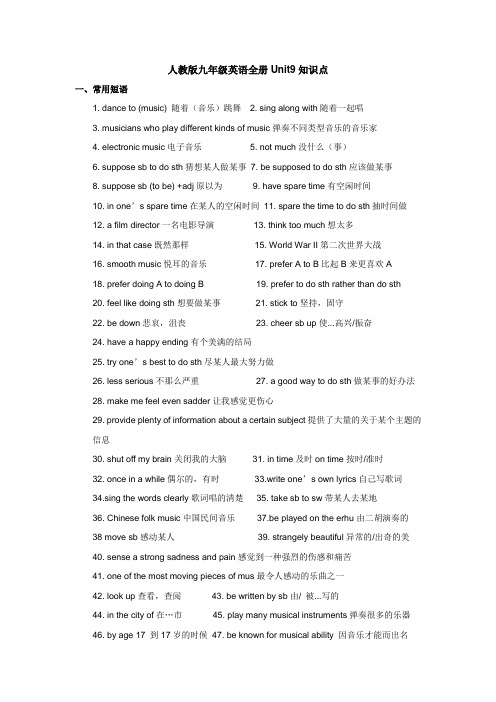
人教版九年级英语全册Unit9知识点一、常用短语1. dance to (music) 随着(音乐)跳舞2. sing along with随着一起唱3. musicians who play different kinds of music弹奏不同类型音乐的音乐家4. electronic music电子音乐5. not much没什么(事)6. suppose sb to do sth猜想某人做某事7. be supposed to do sth应该做某事8. suppose sb (to be) +adj原以为9. have spare time有空闲时间10. in one’s spare time在某人的空闲时间11. spare the time to do sth抽时间做12. a film director一名电影导演13. think too much想太多14. in that case既然那样15. World War II第二次世界大战16. smooth music悦耳的音乐17. prefer A to B比起B来更喜欢A18. prefer doing A to doing B 19. prefer to do sth rather than do sth20. feel like doing sth想要做某事21. stick to坚持,固守22. be down悲哀,沮丧23. cheer sb up使...高兴/振奋24. have a happy ending有个美满的结局25. try one’s best to do sth尽某人最大努力做26. less serious不那么严重27. a good way to do sth做某事的好办法28. make me feel even sadder让我感觉更伤心29. provide plenty of information about a certain subject提供了大量的关于某个主题的信息30. shut off my brain关闭我的大脑31. in time及时on time按时/准时32. once in a while偶尔的,有时33.write one’s own lyrics自己写歌词34.sing the words clearly歌词唱的清楚35. take sb to sw带某人去某地36. Chinese folk music中国民间音乐37.be played on the erhu由二胡演奏的38 move sb感动某人39. strangely beautiful异常的/出奇的美40. sense a strong sadness and pain感觉到一种强烈的伤感和痛苦41. one of the most moving pieces of mus最令人感动的乐曲之一42. look up查看,查阅43. be written by sb由/ 被...写的44. in the city of在…市45. play many musical instruments弹奏很多的乐器46. by age 17 到17岁的时候47. be known for musical ability 因音乐才能而出名48. develop a serious illness得了一种很重的病49. become blind成了盲人,变瞎50. for several years几年51. make money赚钱52. get married (to sb) (和某人)结婚53. continue to do sth继续做某事54.perform in this way用这种形式表演55. during/ in one’s lifetime在某人有生之年56. by the end of到...末为止57. It’s a pity that遗憾的是58. in total总共59. be recorded for the future world to hear被记录下来供后人聆听60. the great erhu masters很棒的二胡大师61. master a foreign language掌握一门外语62. praise...for因为什么赞美63. China’s national treasures中国的国家珍宝64. paint a picture of描绘了一幅画65. recall one’s deepest wounds唤起某人最深的伤痛66. painful experiences痛苦的经历67. a time for spreading joy传播快乐的时间二、重点语法1.prefer的用法【1】prefer A to B、A与B相比较,比较喜欢A例:I prefer English to Chinese. I prefer fish to meat.【2】prefer doing A to doing B,A与B相比,比较喜欢做A 例:I prefer swimming to running.【3】prefer to do A rather than do B,A与B相比,比较喜欢做A 例:I preferred to stay behind rather than go with you.【4】词组prefer not to do “不愿意做...”2. whatever相当于no matter what例:Wherever you go, whatever you do, I’ll be right here waiting for you.3. cheer up高兴起来;振作起来使欢乐;使高兴例:Cheer up!Your troubles will soon be over.He tried to cheer them up with funny stories.2.marry娶;嫁;结婚;和...结婚marry sb. / get married 表示动作例. He married a pretty girl.She married a soldier. =She got married to a soldier.They got married last year.4. keep healthy 保持健康例. In order to keep healthy, he keeps jogging every day.keep in good health, keep fit和stay healthy 都表示“保持健康”巧记以o结尾的名词变复数:注:,hero英雄,tomato西红柿,potato土豆,这些词变复数时要加是-es,其余以o结尾的加-s。
人教版九年级英语unit9知识点内容大全

人教版九年级英语unit9知识点内容大全人教版九年级英语unit9知识点内容一.Unit9知识梳理【重点】1.danceto(music)随着(音乐)跳舞2.singalongwith随着…一起唱3.musicianswhoplaydifferentkindsofmusic弹奏不同类型音乐的音乐家4.electronicmusic电子音乐5.notmuch没什么(事)6.supposesbtodosth.猜想某人做某事7.besupposedtodosth应该做某事8.supposesb(tobe)+adj.原以为…9.havesparetime有空闲时间10.inone’ssparetime在某人的空闲时间11.sparethetimetodosth抽时间做…12.afilmdirector一名电影导演13.thinktoomuch想太多14.inthatcase既然那样WorldWarII第二次世界大战16.smoothmusic悦耳的音乐17.preferAtoB比起B来更喜欢A18.preferdoingAtodoingB19.prefertodosth.ratherthandosth.20.feellikedoingsth想要做某事21.stickto坚持,固守22.bedown悲哀,沮丧23.cheersbup使…高兴/振奋24.haveahappyending有个美满的结局25.tryone’sbesttodosth.尽某人最大努力做…26.lessserious不那么严重27.agoodwaytodosth做某事的好办法28.makemefeelevensadder让我感觉更伤心29.provideplentyofinformationaboutacertainsubject提供了大量的关于某个主题的信息30.shutoffmybrain关闭我的大脑【重点句型】1.Ilovesingerswhowritetheirownmusic.我喜欢自己创作曲子的歌手。
人教版九年级英语u9知识点

人教版九年级英语u9知识点U9知识点在人教版九年级英语教材中,Unit 9是一个非常重要而且有趣的单元。
它主要涉及到人物的性格特点、环保、交通工具等多个方面的知识点。
通过学习这些知识点,学生可以在英语学习中丰富自己的词汇量,提高自己的口语表达能力。
以下将围绕这几个主题展开讨论。
1. 人物的性格特点在这个单元中,我们学习了关于人物性格特点的表达方式,例如勇敢的人可以用"brave"来形容,善良的人可以用"kind"来形容,还有聪明、有趣、有耐心等等。
通过学习这些词汇,我们可以更准确地描述一个人的性格,也可以为自己的写作和口语表达提供更多的素材。
2. 环保保护环境是我们每个人的责任。
在这个单元中,我们学习了一些关于环保的知识,例如如何减少污染、节约能源、回收垃圾等等。
这些知识点对于我们每个人来说都非常重要,我们应该积极参与到环保活动中,为保护我们的地球尽一份力。
同时,这些知识点也是我们英语学习的一部分,通过学习环保知识,我们可以拓展自己的词汇量,提高自己的口语表达能力,将环保的理念传递给更多的人。
3. 交通工具交通工具是我们日常生活中必不可少的一部分。
在这个单元中,我们学习了关于交通工具的词汇,包括汽车、自行车、火车、飞机等等。
学习这些词汇可以帮助我们更好地理解和描述交通工具,也可以为我们的日常生活和旅行提供更多的表达方式。
此外,我们还学习了关于交通规则和安全的知识,这对于我们出行和保护自己的安全都非常重要。
总结起来,人教版九年级英语U9知识点既包括了人物的性格特点,又涉及到了环保和交通工具等方面的内容。
通过学习这些知识点,我们可以提高自己的词汇量,拓展自己的口语表达能力,丰富自己的英语知识。
不仅如此,这些知识点也与我们的日常生活紧密相关,对于我们的实际生活和学习都有着重要的意义。
因此,我们应该认真对待这些知识点,努力学习并将其应用于实际中,使自己的英语水平得到提高。
人教版英语九年级全册Unit 9知识精讲

人教版英语九年级全册Unit 9知识精讲Unit 9 I like music that I can dance to.Section A1. I like music that I can sing along with. 我喜欢我能随着唱歌的音乐。
along with意为“与……在一起;在……以外;沿着;随着”。
如:I can't go along with your view.我不能赞同你的观点。
例:她和她的男朋友一道来用餐。
She came to dinner ______ _____ her boyfriend.答案:along with2. You know what I mean. 你懂我的意思。
mean在这里指“(字、句等)意指,意味”的意思。
如:This word means nothing.这个词没有意义。
Do you know what I mean?你懂我的意思了吗?拓展:mean用作及物动词,意为“意欲,计划”。
如:I meant this photo for my mother.我准备把这张照片送给我的妈妈。
What does he mean to do?他想干什么?mean表示“使有可能,预示”的意思。
如:This snow means no sport this afternoon.这场雪使今天下午的体育活动搞不成了。
3. I prefer movies that give me something to think about. 我更喜欢能让我思考的电影。
prefer用作动词,表示“更喜欢,宁愿”,后接动词时,可用不定式或动名词。
表示一般情况用动名词,表示特定动作用不定式。
如:(1)I prefer walking alone. 我喜欢一个人溜达。
(2)A:Can I give you a lift? 你顺便坐我的车走吗?B:No, thanks. I prefer to walk. 不用了,谢谢,我喜欢步行。
- 1、下载文档前请自行甄别文档内容的完整性,平台不提供额外的编辑、内容补充、找答案等附加服务。
- 2、"仅部分预览"的文档,不可在线预览部分如存在完整性等问题,可反馈申请退款(可完整预览的文档不适用该条件!)。
- 3、如文档侵犯您的权益,请联系客服反馈,我们会尽快为您处理(人工客服工作时间:9:00-18:30)。
Unit 9 I like music that I can dance to.语法定语从句1.在复合句中,修饰某一名词或代词的从句叫做定语从句。
被定语从句修饰的词叫做先行词。
定语从句必须放在先行词之后。
定语从句主要由关系代词that,which,who(宾格是whom,所有格是whose)引导。
.This is the present that he gave me for my birthday.Do you know everybody who came to the party?2.当先行词是人时,定语从句由that,who引导,当先行词是物时,定语从句由that,which引导。
The person who broke the window must pay for it.The girl(who)we met yesterday is Li Lei’s sister.A dictionary is a book which gives the meaning of words.The fish(which) we bought were not fish.A plane is a machine that can fly.The dumplings(that)I made were delicious.练习:用适当的关系代词填空1. The house _______ we live in is very big.2. The boy ______ is wearing the black jacket is very clever.3. This is the present _____ he gave me for my birthday.4. The man _______ talked to you just now is an engineer.5. There is nothing in the world _______ can frighten him.6. We visited a factory _______ makes toys for children.3.当关系代词指物时,只用that不用which的情况.(1)当先行词为all、something、everything、anything、nothing、the one等不定代词时All that he said is true.(2)当先行词被the very(正是那个)、the only(唯一的)、the just(正是那个)修饰时This is the only dictionary that I have.(3)当先行词被形容词最高级修饰时This is the most beautiful city that I have visited.(4)当先行词被序数词修饰时。
This was the first lesson that we have this term.(1)The skirt is made of silk is very expensive. I can’t afford it.A. whatB. /C. thatD. it(2)Do you know the girl is singing in the classroom?A. whoB. whichC. when(3)The woman is talking to our English teacher is Kate’s mother.A.sheB. whoC. whom(4)Sorry,we don’t have the coat you need.A. whatB. whoC. that(5)The girl I just talked with is Ben’s sister.A. sheB. herC. who(6)The subject I like best is English.A. thatB. itC. who(7)He’s the boy bought a bike here.A. beB. thatC. whom(8)My money is not the only thing ______ is missing.A. whichB. thatC. whoD. whose(9)This is the best hotel in the city I know.A. whereB. whichC. thatD. itSection A1.along with意为“伴随着”,还可以表示“和……在一起”。
I’m going shopping along with my mother. I’m going along with you.sing along with the music伴随着音乐唱歌.I like the music that I can sing ______.A. along andB. along withC. withD. along2.dance to意为“随着……的节拍跳舞”,to为介词,意为“按照,随着”The students are doing morning exercises to music.dance to the music伴随着音乐跳舞—What about dancing? —Oh,the music is too quick. I can’t dance it.A. toB. withC. onD. in3.prefer“更喜爱,更喜欢”,相当于like……better,其过去式、过去分词为preferred,现在分词是preferring 三单正常,是prefersprefer常用于以下结构:(1)prefer sth to sth.“喜欢……而不喜欢……”I prefer dogs to cats.(2)prefer doing to doing“宁愿做……不愿做……”I prefer walking to sitting.(3)prefer to do rather than do= would rather do…than do…= would do…rather than do…“宁愿做…不愿做…”I prefer to work rather than be free.(1)They preferred rather than a bike.A. to walk; to rideB. walking;ridingC. to walk;ride(2)I prefer skiing to .The snow makes me excited.A.cyclesB. cyclingC. cycled4.提建议的表达方法及应答(1)What/How about doing sth?意为“做某事怎么样?”What about going fishing with me this afternoon?(2)Why don’t you do sth?或Why not do sth?意为“你为什么不做某事呢?”Why don’t you buy your mother some flowers?=Why not buy your moth er some flowers?(3)Let’s do sth意为“让我们做某事吧!”Let’s go to school by bike.(4)Shall we do…?意为“我们去做……好吗?”Shall we go to the park on Sunday?(5)You’d better do sth./You’d better not do sth.意为“你最好做某事/你最好不要做某事。
”It’s cold outside.You’d better put on your coat.(6)You should do sth.意为“你应该做某事”You shouldn’t do sth.意为“你不应该做某事”You should go to bed early.(1)肯定回答①Good idea.好主意②That sounds great.听起来好极了(2)否定回答①Sorry,I…; ②I’m afraid I can’t(1)—I feel a bit hungry now.—Why not for dinner with us?A. goB. Did you goC.to goD. do you go(2)—It’s a fine day today.Shall we go swimming?—But we need to be home before six o’clock.A. Have a nice time!B. Not at all.C.You are right.D. Good idea!(3)Why don’t you buy your mother a scarf for her bi rthday?(改为同义句)Why your mother a scarf for her birthday?(4)Shall we have a picnic at the weekend? (改为同义句)having a picnic at the weekend?(5)—We’ll go to Qing Yuan Mountain tomorrow.Why join us?—That’s a good idea.A. notB. don’tC.can’tD. didn’t5. different kinds of意为“不同种类的”There are different kinds of books in the bookstore.6. America 美国;美洲American美国的;美国人的,美国人Australia澳大利亚Australian澳大利亚的,澳大利亚人7. electronic computer电子计算机8. noise名词,“噪音”,noisy形容词“喧闹的,嘈杂的”,副词noisily吵闹地I can’t work here—it’s too noisy.(1)voice一般指人的声音,如说话,唱歌,但有时也可指鸟叫的声音。
The girl has a beautiful voice.(2)sound指人能听见的任何声音。
Sound travels more slowly than light.(3)noise常指不悦耳、不和谐的嘈杂声。
